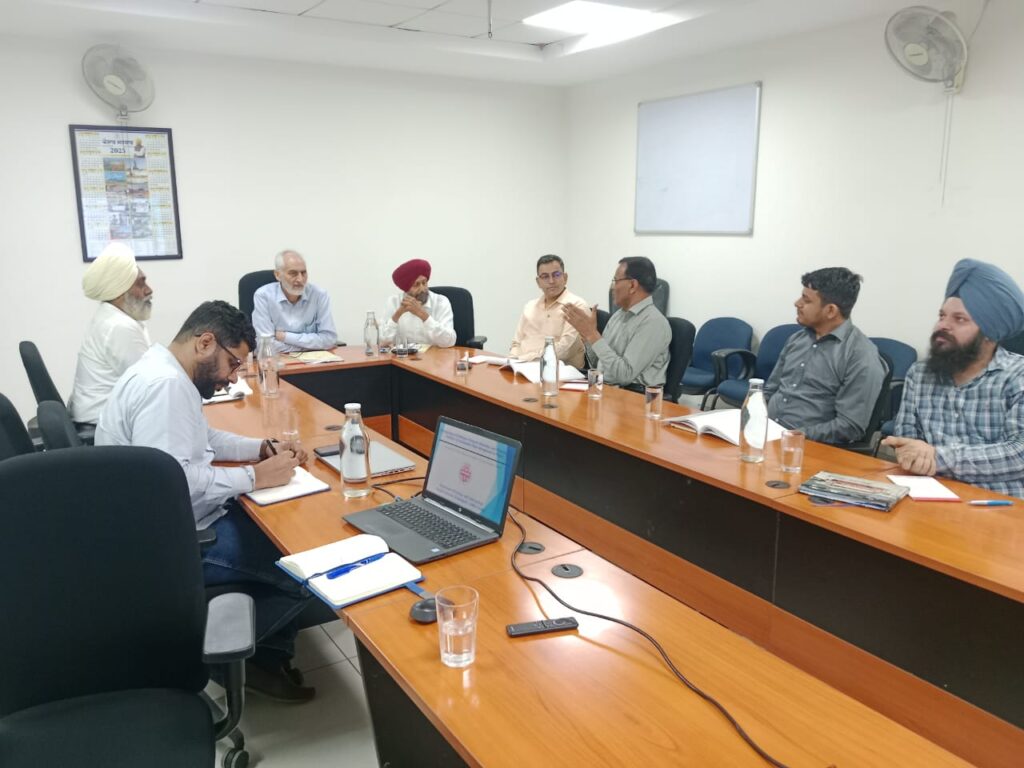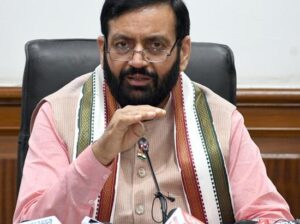The Fact News Service
Chandigarh, June 16
PA quality and quantity, organised a two-day workshop on 12-13th June, 2025 to discuss a comprehensive micro-level study covering carbon dating, isotope study of sub-soil water, and seepage study in Punjab, chaired by Prof. Dr. Sukhpal Singh, Chairman Punjab State Farmers’ and Farm Workers Commission (PSFC). Dr. Gurkanwal Singh, former Director of Horticulture, Punjab co-chaired the meeting.
The meeting was organized by Dr. R.S. Bains, Administrative Officer-cum-Secretary, PSFC.
First day, a long deliberation focused on Punjab’s pressing hydrogeological challenges, with experts from Punjab Agricultural University (PAU), Ludhiana, and Punjab University, Chandigarh, presenting critical research findings and sustainable solutions for groundwater management.
Dr. J.P. Singh, Professor and Head of Soil and Water Engineering, and Dr. Samanpreet Kaur, Principal Scientist, PAU Ludhiana, made a detailed presentation on hydrological concerns and potential solutions. Dr. Kaur emphasised the urgent need to develop a smart submersible pump specifically for Punjab, enabling farmers to access real-time data for the judicious use of groundwater, to make them sensitive about the grim position of ground water. The discussions spanned issues such as water-logging, rapid depletion of sub-soil water, groundwater recharge efficiency, recharge techniques, salinity/ sodicity, seepage and studies required.
Further, she informed that PAU has developed several modules for rainwater harvesting, which need to be finalised and disseminated at a large scale. The issue of contamination in both drinking and irrigation water also generated serious concern. The scientists proposed various studies, including a historical analysis of Punjab’s water systems, the use of abandoned wells and village ponds for groundwater recharge, identification of agro-ecological resource zones, and comparative studies on recharge levels under puddling and direct-seeded rice (DSR) cultivation.
Dr. J.S. Sehrawat, professor & head, Department of Anthropology, Dr. Mahesh Thakur, Assistant professor, Department of Geology, Panjab University, Chandigarh, along with research fellow Sh. Prakash Tiwari and Sh. Jugraj Singh presented on Hydrogeological Challenges, Research Outcomes, and Proposed R&D Solutions for Sustainable Water Management in Punjab. Their presentation focused on emerging and hazardous water contaminants such as uranium and arsenic in various regions of Punjab. The team shared findings from a study conducted in five districts, mapping contamination in both water and soil, with particularly alarming results in south-west Punjab. The discussion also covered contamination in soils linked to agricultural and industrial activities. The team underlined the urgent need for further research, including district-wise spatial mapping of contamination, groundwater vulnerability assessments, water quality indexmapping, and irrigation suitability studies. It was also discussed that excessive draft can lead to subsistence of soil.
Dr. Arun Kumar, JDA (HG), Dr. Sandeep Singh Waliya, Mr. Deepak Sethi, and Mrs. Reetika, Assistant Geologists officers from the Hydro-geological Wing of the Directorate of Agriculture & Farmers Welfare, Punjab, presented their work on the state of groundwater in Punjab, On the second day. Their presentation highlighted a dire situation, out of 153 blocks, 115 are over-exploited due to excessive groundwater extraction. The average groundwater extraction rate in the state stands at a staggering 153.86%, meaning Punjab is drawing 1.5 times more water than is being recharged.
The groundwater deficit has reached alarming levels, with an annual shortfall of nearly 10 million acre-feet (MAF) between extraction and natural recharge. This unsustainable imbalance poses a severe threat to Punjab’s agricultural sustainability and long-term water security. The primary driver of this crisis is excessive water usage for paddy cultivation, underscoring the urgent need for all stakeholders collaboration in finding viable alternatives and sustainable solutions.
Prof. (Dr.) Sukhpal Singh, Chairman, PSFC, stressed the urgency of scientific interventions to prevent an impending water crisis. He further appraised that a Data Centre is being established at PSFC for delivering authenticated exclusive agri-related processed data by collaborating research works of all leading research organisations to the policy makers, students and other stakeholders. Dr. Gurkanwal Singh called for interdisciplinary collaboration between researchers, policymakers, and farmers. Dr. R.S. Bains assured that PSFC would facilitate further studies and policy advocacy. The meeting marked a significant step toward sustainable water management in Punjab, with a commitment to evidence-based solutions for long-term agricultural and environmental resilience.








